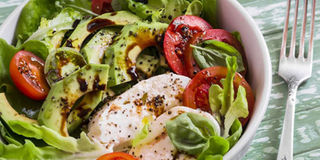Eating for your skin type

The skin can be sensitive depending on one's diet. PHOTO/COURTESY
What you need to know:
- The general rule of thumb for healthy skin is eating a balanced diet no matter what type of skin you have.
Makeup can be helpful in hiding blemishes, freckles and wrinkles on our faces but nothing beats healthy eating since good skin health depends on what we eat.
The general rule of thumb for healthy skin is eating a balanced diet no matter what type of skin you have. Drinking a lot of water, having enough rest, as well as engaging in physical exercise, all contribute to a healthy and beautiful skin.
Dr Henry Ssekyanzi, a general practitioner at Mulago National Referral Hospital, says keeping hydrated is an important aspect of healthy living because drinking a lot gives the skin to give a radiant, healthy look. Generally, drinking a lot of water contributes a lot to a beautiful and healthy skin but if drinking water is not fun for you, you can eat lots of fruits instead.
Watermelon, for instance, is a good hydrating option for you. This is because it will make you feel full, as well as keep you hydrated all the time.
“Vitamin A and C found in the watermelon are good for skin and hair health because they help to create and repair skin cells. Without enough vitamin A, your skin can look dry and flaky. The vitamin C helps your body make collagen, a protein that keeps the skin elastic and hair strong,” he says.
Avocado is another recommendation for a healthy skin, according to Lydia Aisu Pedun, a dietitian. “It has natural oils that deeply penetrate the skin to nourish, soften and hydrate it. The vitamins E and C contained in it boost the skin’s immunity against stress, thereby reducing aging lines and wrinkles,” she says.
Dry skin
One of the major causes of dry skin is lack of water. You, therefore, need to increase your water intake for a better skin. Another reason could be because your diet lacks the foods that contain healthy fats and oils that would give your skin moisture and elasticity.
This does not mean you feast on fast foods because these are usually deep-fried in trans-fats that are used and reused, thereby releasing free radicals that cause inflammation, a major underlying cause of chronic skin conditions.
Aisu says: “Eat less junk and processed foods. You can instead eat foods with natural oils and fats such as nuts and seeds such as cashews, chia seeds and hazelnuts. Also, avocados are good sources of Vitamin E that moistens the skin to make it radiant.”
Vitamin A rich foods and fruits such as watermelon, tomatoes, passion fruits, carrots, spinach, sweet potatoes, and red beans help in the formation of collagen, that makes your skin retain moisture.
Oily skin
Oily skin is often caused by excess consumption of oily foods. Incorporating foods with a low glycemic index such as whole grains, fruits and potatoes will help improve your complexion and reduce skin inflammation. Also, reduce your intake of sweet foods.
“Watch out for foods that contain high sodium because they damage the skin. High fibre foods, fruits and vegetables are highly recommended for a healthy skin because they help to cleanse the toxins in the body. Cucumbers, carrots, berries and green teas are also great because they contain antioxidants and are anti-inflammatory,” Ssekyanzi says.
Take note
•According to Dr Henry Ssekyanzi, a general practitioner, alcohol consumption spikes blood sugar levels and contributes to depletion of collagen. Alcohol is also dehydrating, thereby preventing your skin from retaining moisture, causing dark circles around your eyes.
•Processed meats contain sodium, which can lead to water retention and can cause swelling and puffiness in your face.




